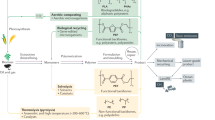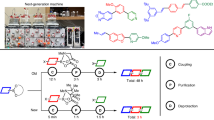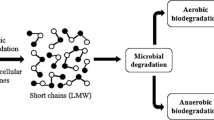Abstract
FOR some years it was standard practice in these laboratories to pyrolyse polymers in an intimate mix with ignited silver sand under carefully controlled conditions in an inert partial atmosphere. The degradation products were fractionated and examined by gas–liquid partition chromatography. The performance of the entire process in one stage was considered as a natural development of the technique, and the piece of apparatus to be described is now in regular use.
This is a preview of subscription content, access via your institution
Access options
Subscribe to this journal
Receive 51 print issues and online access
$199.00 per year
only $3.90 per issue
Buy this article
- Purchase on Springer Link
- Instant access to full article PDF
Prices may be subject to local taxes which are calculated during checkout
Similar content being viewed by others
References
Grassie, N., and Melville, H. W., Proc. Roy. Soc., A, 191, 1 (1949).
Author information
Authors and Affiliations
Rights and permissions
About this article
Cite this article
JONES, C., MOYLES, A. Rapid Identification of High Polymers using a Simple Pyrolysis Unit with a Gas–Liquid Chromatograph. Nature 189, 222–223 (1961). https://doi.org/10.1038/189222a0
Issue Date:
DOI: https://doi.org/10.1038/189222a0
This article is cited by
-
Charakterisierung von Ionenaustauschern auf Kunstharzbasis durch Pyrolyse-Gas-Chromatographie
Fresenius' Zeitschrift f�r Analytische Chemie (1973)
-
Ein einfaches Verfahren zur Identifizierung organischer Polymerer durch Pyrolyse und Gaschromatographie
Fresenius' Zeitschrift für analytische Chemie (1964)
-
Pyrolysis and Gas-Liquid Chromatography on the Microgram Scale
Nature (1961)
Comments
By submitting a comment you agree to abide by our Terms and Community Guidelines. If you find something abusive or that does not comply with our terms or guidelines please flag it as inappropriate.



